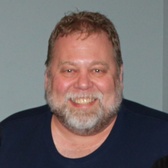

Gahanna Lincoln High School, Gahanna, Ohio
10, 11, 12
Science Chair
Mr. Donelson is part of the 2013 NITARP class. He tweets at @mrdglhs.
Mr. Donelson writes:
Just wanted to let you know I just got hired this semester as an adjunct professor teaching beginning astronomy at Capital University. It sure helped having NITARP on the resume!!
Mr. Donelson is retiring after 39 years in the classroom. There was a very nice article in his local paper celebrating his accomplishments, and that of his students. Congratulations!
Mr. Donelson and his team got some nice local coverage.
Mr. Donelson has just been selected as a NITARP educator and is already getting good press coverage. Way to go!
My students now view research as done by ordinary people, who enjoy looking for unknown patterns and abnormalities in data, yet also enjoy “coaster flipping” in the restaurant and crack jokes when the working environment gets tense, just to lighten the mood and help us remember that exploration is fun!
I have been a teacher for 38 years, and have been in probably 18-20 special programs over that time to improve myself as a science teacher. The NITARP program ranks as one of the three best programs I have been in over that period of time.
I have been a teacher for 38 years, and have been in probably 18-20 special programs over that time to improve myself as a science teacher. The NITARP program ranks as one of the three best programs I have been in over that period of time. It helped make astronomy “doable” … learning to use the Kepler databases and some of the instruments, like periodograms, phase binning, etc., stretched us as teachers/student, yet helped us to realize we can do true scientific research. I personally thought our project was engaging to our students and myself, and wasn’t just another “cookbook exercise.”
It seems to me that programs like NITARP and other engaging education programs need to be studied/analyzed and results used to drive new programs, both in high school and college. We can’t depend on student interest only to supply the next generation of astronomers. We need to be actively engaged in that task. I am surprised that so few astronomers see the urgency of the need.
I found a wonderful book on The Mathematics of Astronomy. It is fairly simple in concept, and as I leafed through it, I realized I am doing A LOT of what is in that book … just not maybe intentionally mentioning the math part as much. So I am purchasing one of these and will rethink some of what I teach next year, and perhaps incorporate some new areas of math into my science classes.
I just wanted to let you know that this 38 year veteran teacher believes [NITARP] is one of the greatest types of professional development I have ever done, and MANY students will benefit from your hard work here in Central Ohio for years to come. Thanks so much for all your efforts, especially this year!
I am currently doing my unit in my Space Tech class on stellar evolution, and I have added about 2 more weeks of info/labs to this from all I have learned this year via my NITARP experience. Although I knew the basics before, and have taught them for about 18 years, I feel like I'm teaching a whole new unit and can not only go deeper with my kids, but do it with much more passion.
But for me as a teacher, I am going to use this data base and some of what we did to do a better job of teaching stellar evolution ... especially as it relates to hydrogen core, hydrogen shell, and helium core burners. We will try to do some similar things in class that we did this summer ... how to use a light curve, how to use a periodogram to find periods, etc. This will help bring some practicality to astronomical theory.
The process of gathering and analyzing data was very important to help show my kids what real research is like. And since our data didn't come out nice and neat like some labs do, it really helped push my kids to think outside the box.
Dave, Steve, and Sally really helped us feel comfortable and understand our basic tasks and we had a blast while learning. I can’t wait to work regularly with them, as well as with Holly and Danielle.
[about some of the students from the 2012 class] They knew their stuff and fielded questions well. Most of all, you could tell they had grown as students and were passionate about their topics and what they had found. To me, that was awesome. I hope my students will show the same poise...
I’ve always thought that probably most astronomers were just normal people who had a passion for astronomy, and my experience confirmed that. I felt like many of the astronomers I talked to were able to have normal conversations as well as “wow” me with lots of data and analysis.
I am a teacher who really tries to help kids think and make learning fit individual styles, because I believe much of what is done in the science classroom today does not inspire learning, thinking, or passion for science. But I wasn’t expecting a discussion about that in any of the astronomy sessions. I was certainly wrong on that account.